Women Peace and Security E News September 2018

Building a Feminist Peace Movement: A Reflection on WILPF’s Feminist Peace in Africa Forum and the 32nd Congress in Ghana
By Abigail Ruane, WILPF’s Women, Peace and Security Programme Director
Some of the participants of the Feminist Peace Movement in Africa Forum celebrating solidarity and unity (Photo: WILPF)
Last month, 250 activists from 37 countries came together in Accra, Ghana for WILPF’s 18 August Feminist Peace Movement in Africa Forum and 20-22 August 32nd Triennial International Congress to strengthen and mobilise a feminist peace movement.
At the Forum, WILPF’s vibrant community exchanged learning from the innovative and powerful nonviolent work of women leaders in Africa. At the Congress, WILPF welcomed a new international board in an updated governance structure and adopted resolutions on militarism and migration.
It was reinvigorating to reconnect with sisters from around the world, exchange learning and stories, and re-ignite determination to mobilise for feminist peace.
The WILPF Secretary-General, Madeleine Rees, affirmed the critical leadership of women peace leaders across the African continent. “I have been most stunned by the power and strength of African women, and their determined demands that we must have peace”, she stated. “The bigger the feminist peace movement is, the greater the possibilities are for the peace we so desperately need.”
“These are feminists who fight injustice, discrimination, above all, inequality,” affirmed University of Ghana Professor Kate Addo Adeko. “To enhance peace procsses, more women peace leaders – LIKE YOU – should participate!”
Peace leaders from around the world shared their experiences and built strategies for change. “We Africans are tired of war”, stated one participant from the Democratic Republic of the Congo (DRC). “In our region, military initiatives are popping up like mushrooms”, stated one activist from Costa Rica. “I joined WILPF because I saw a different vision of peace”, affirmed an activist from Afghanistan. “This is missing around the world.”
“I am in awe of a section-to-section collaboration”, stated an activist from the US section. “The African Working Group is an excellent example of the way WILPF works: not just through a one-way capacity building, but by means of mutual exchange between countries. I look forward to move of this”.
Activists explored strategies and learning on feminism and a variety of key issue areas, including conflict drivers, elections, disarmament, prevention, mediation, political economy, masculinities and engaging men, migration and displacement. As the 2017 Nobel award-winning Nuclear Ban showed, “it is about the relationships we build with each other that create change”.
As we return from Accra to our communities in every region of the world, our time together has strengthened our movement and vision. Together, we are renewed in our determination to keep mobilising for feminist peace.
Join us! We are all in this together.
Watch the highlights of WILPF’s 32nd International Congress in Accra, Ghana here>>
Watch the highlights of the Feminist Peace Movement in Africa Forum here>>
Inside the UN Security Council: Mediation and the Settlement of Disputes
By Colleen Bromberger, United Nations Security Council Monitor
Mossarat Qadeem, Co-founder of PAIMAN Alumni Trust, addresses the Security Council meeting on the maintenance of international peace and security, with a focus on mediation and settlement of disputes (Photo: UN Photo/Evan Schneider)
On 29 August 2018, under the Presidency of the United Kingdom, the Security Council convened an open debate on the importance of mediation for conflict prevention. Briefers and representatives of Member States used the debate as an opportunity to both highlight good practices in settling disputes as well as address problems in the current practice of mediation. Many representatives and briefers noted that women’s participation as mediators in peace processes and peacebuilding are linked to more durable peace, which is the key to the sustainability of peace in post-conflict settings.
Women mediation networks, including FemWise, Mediterranean Women Mediators Network, Nordic Women Mediators and Women on the Frontline, were recognised to provide opportunities for women mediators to share their expertise, collaborate on enriching future work in mediation, and change the trajectory of negotiations in conflict settings for more durable outcomes in peace processes. Also, mediation initiatives focused on Track 1 processes must connect formal with informal women mediators to strengthen and interlink constituencies for peace. Mediation must be just one part of a broader push for participation that strengthens women’s political participation to meaningful participation in peace processes.
Read WILPF’s Analysis of the UNSC Open Debate on the Maintenance of International Peace and Security: “Mediation and the Settlement of Disputes” here>>
Reaffirming World’s Commitment to Peace
By Mikayla Varunok, United Nations Monitor
Epsy Campbell Barr, First Vice-President and Minister for Foreign Affairs of the Republic of Costa Rica, makes remarks during the Nelson Mandela Peace Summit (UN Photo/Cia Pak)
On 24 September 2018, nearly 100 representatives from Member States, intergovernmental organisations and civil society gathered in the United Nations Headquarters for the Nelson Mandela Peace Summit. The Peace Summit offered world leaders the opportunity to renew their commitment to global peace, conflict prevention, conflict resolution, peacebuilding, promotion and protection of human rights and long-term development initiatives. Indeed, the outcome document of the Summit, a political declaration, reaffirmed the values of the late Nelson Mandela as well as Member States’ commitments to ensuring sustainable and long-lasting peace rooted in prevention with an integrated approach.
One of the most common Nelson Mandela quotes to be cited at the Summit was: “To be free is not merely to cast off one's chains, but to live in a way that respects and enhances the freedom of others”. This stood in stark contrast to the lack of representation and recognition of the rights and roles of women displayed in the statements delivered at the Summit. References to Women, Peace and Security were discussed by only 18% of speakers and 12 of the speakers at the Summit were women. Although the political declaration recognises that women’s early and full engagement in peace processes increases awareness of, and responsiveness to, women’s rights and needs, Member States should also match their actions and words and ensure that women are meaningfully represented in peace work.
Read WILPF’s full analysis of the Nelson Mandela Peace Summit here>>
Find the Political Declaration To Be Adopted At The Nelson Mandela Peace Summit here>>
Mozambique Launched its First National Action Plan on Women, Peace and Security
By Rocio Maradiegue, Women, Peace and Security Programme Consultant
(Visual: OpenClipArt)
In May 2018 Mozambique launched its first UNSCR1325 National Action Plan (NAP) for a period of five years (2018-2022). Developed by Ministry of Gender, Children and Social Action and the Ministry of Foreign Affairs and Cooperation and others, the NAP aims to strengthen the integration of a gender perspective in peace and security actions and management, and guarantee women’s participation in peace work. Through the adoption of its first NAP, the Mozambican Government demonstrates its commitment to addressing key issues women face in the follow-up of violence as well as supporting women’s actions to promote peace.
The inaugural NAP demonstrates a good practice by focusing on the important role of resources in the WPS implementation by allocating a budget to each objective of the NAP. Civil society also plays an integral role in the implementation and monitoring and evaluation stages of the NAP. At the same time, the NAP fails to recognise the importance of disarmament for peace and the impact of arms on women. This limits further opportunities to deliver on the objectives presented in the NAP, especially around conflict prevention.
Read WILPF’s Analysis of Mozambique’s UNSCR1325 National Action Plan here>>
Find WILPF’s National Action Plan Development Toolkit here>>
Learning from the Feminist Peace Movement in Africa
By Rocio Maradiegue, Women, Peace and Security Programme Consultant
WILPF members at the December 2017 WILPF Africa Regional Conference in the DRC (Photo Credit: WILPF)
On 18 August 2018, WILPF held a Forum on the Feminist Peace Movement in Africa. The Forum took place in Ghana, where 250 women from 16 African countries and international WILPF sections and partners attended. The aim of the Forum was to bring together women peace activists to address various topics, including root causes of violence, the role of women in social transformation, economic justice and peace building, all within the context of Africa. The Forum showcased the long-standing and powerful feminist peace movement that keeps growing despite the process of exporting violence and exploiting lives across Africa.
The outcomes of the Forum revolved around the reality that the feminist peace movement in Africa is diverse, active, growing and robust. “African feminist peace activists need to unite regionally and continue to connect with the progressive global women’s movement”, said the newly-elected WILPF President, Joy Onyesoh. Global feminist peace movements share the challenge of the glorification of militarism and war. In order to increase the power of the movement, it is essential to expand women’s influence, meaningful participation and rights as well as strengthen solidarity and alliances between each other.
Read WILPF’s Forum Report on the Feminist Peace Movement in Africa here>>

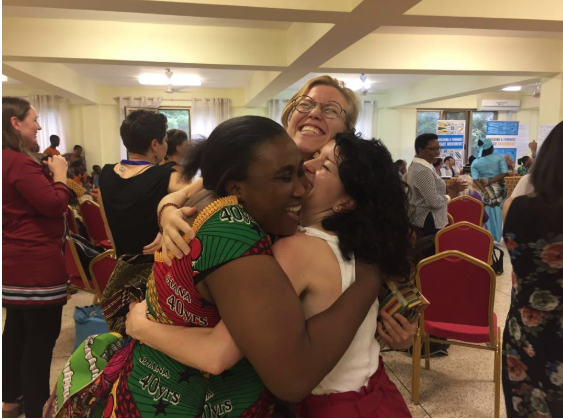
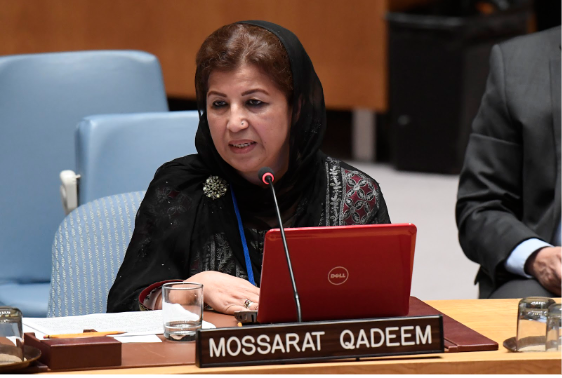
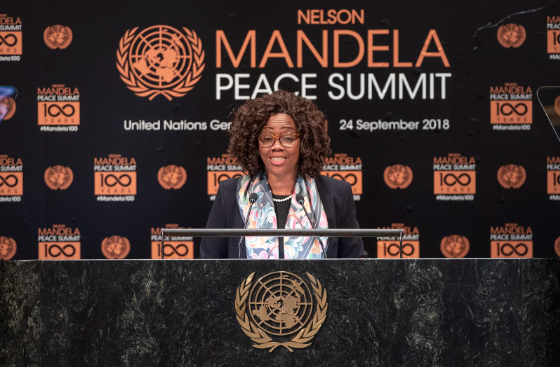
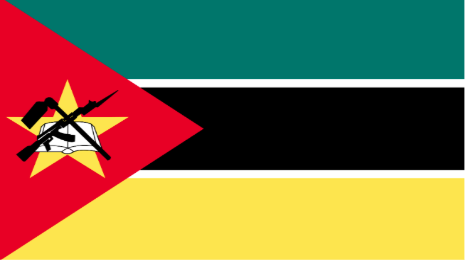
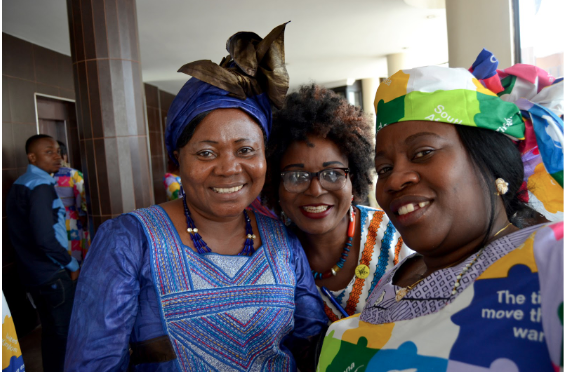
WILPF INITIATIVES
Monthly Action Points (MAP) For The Security Council: August 2018
Exclusive Interview: New WILPF International President Elected
Press Release: Feminist Peace Activism Rising In Africa
WILPF Congress Opens By Welcoming Five New Sections
Feminist Peace From An African Perspective: Video Highlights
Women’s Rights Beyond The Business Case: Ensuring Corporate Accountability
United Nations General Assembly First Committee Briefing Book
Oral Statement To UN Human Rights Council 39th Session: Interactive Dialogue On Libya
Secretary-General Madeleine Rees To Speak At HRC39 Panel On Gender
RESOURCES
Afghan Women Key To Sustainable Peace In Afghanistan
The Road Towards A National Action Plan On Women, Peace And Security For Lebanon
Finding A Path To Justice In Iraq: The Question Of ISIS Prosecutions
Local Voices In Global Spaces: Influencing International Norms And Standards
To Change The World Let Refugee Women Lead
The Future Of Feminist Foreign Policy
Peace Is Not Enough
The World Is Failing Women And Girls Whose Bodies Have Been Weaponised
INITIATIVES
#HerStoryOurStory Resource Against Violence
Women Make Peace Stick
Sweden’s Handbook On Feminist Foreign Policy
Medica Liberia, UNDP Conduct Gender Mainstreaming Refresher Workshop
The Oxford Handbook On Women, Peace And Security
Korean Women, South And North: Peace, Reconciliation, Rights And Development